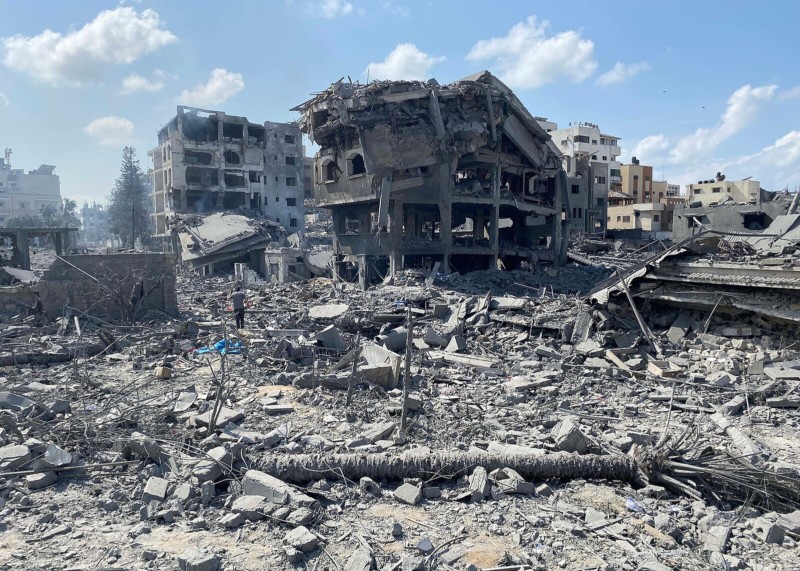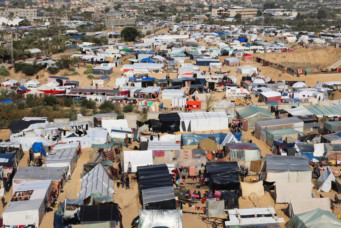Scouring for Meaning, and Hope, in the Rubble of Gaza
The latest war in Gaza has shocked the world by its sheer violence, and the potential to escalate into a full-blown regional conflict. Worst of all has been the international community’s deafening silence

Palestinians inspect the damage following an Israeli airstrike on the El-Remal aera in Gaza City. October 9, 2023. Creative Commons (Wafa in contract with APAimages)
All wars—big or small, long or short, decisive or inconclusive—severely test the limits of our collective conscience. They challenge us to closely scrutinize our degree of empathy toward its victims. They force on us stark moral choices on whether the means of violence justify the ends of achieving the cause we deem to be legitimate. Indeed, oftentimes our very humanity is tested.
The current war unfolding in Gaza between Israel and Hamas is certainly no different. However, what distinguishes this latest round of conflict is its alarming tendency to defy the familiar patterns that we have come to associate with the Palestinian–Israeli conflict: the limits to the use of force, the inhibitions to escalation on both sides, and a willingness to leave the door open to negotiations once the guns fall silent.
We may yet be in the early days of this latest episode of violence in Gaza, but it is already revealing disturbing implications, with tragic consequences for its victims. The extreme levels of violence, the dehumanization, and the risks of wider regional escalation are all manifestations that threaten to make this war one of the most destabilizing in terms of its outcome, and among the most calamitous in terms of the sheer humanitarian toll it will claim.
In waging its deadly onslaught on Gaza, Israel has entirely abandoned the normative and ethical frameworks that the international community has sought to uphold in times of war. The scale, intensity and utter brutality of the destruction mercilessly visited on Palestinian civilians in Gaza by Israel’s war machine defy any attempt at comprehension or any justification in the name of “self-defense”.
In the first week following Hamas’ October 7 attack, Israel dropped 6,000 bombs on Gaza, which is as many as it used throughout its 50-day war in Gaza in 2014. At the time of writing, 4,385 people have been killed, including 1,756 children and 967 women, according to the Ministry of Health in Gaza. An additional 13,561 people have been injured. There are 1,000 more estimated to still be trapped under the rubble of the civilian infrastructures targeted by Israel.
One million Palestinians are estimated to be displaced, half of them children. Outside of Gaza, 84 Palestinians, including at least 27 children, have been killed by Israeli security forces in the occupied West Bank. This year has been the deadliest for Palestinians in the West Bank since the UN Relief Works Agency (UNRWA) began collecting data in 2012, already seeing over 270 killed.
The World Health Organization (WHO) has documented over 136 attacks on healthcare facilities in Palestinian territories since October 7. It condemned Israel’s order to evacuate 22 hospitals in northern Gaza as a “death sentence” for those seeking medical care in these facilities. Moreover, out of 22 primary healthcare centers run by UNRWA, only eight are partially functioning; the rest have been destroyed by Israeli attacks.
Additionally, UN experts estimate that as a result of Israel’s current siege on Gaza, 2.2 million Palestinians are lacking essential food, water, medicine, electricity, and fuel, and 50,000 pregnant women are in desperate need of medical assistance. Water production capacity in Gaza is currently at 5 percent of normal levels, and the aid trucks that have crossed from Egypt so far only carried enough water for 22,000 people for one day.
Equally horrific has been the dehumanization that has accompanied Israel’s relentless military onslaught against Gaza. How are we meant to understand the references by Israeli officials to Palestinians as “animals”; the calls to turn Gaza into “Dresden,” recalling the worst excesses of aerial bombardment against civilian populations during the Second World War; the deliberate strategy of forced displacement of hundreds of thousands from their homes; the complete closure of the Gaza strip denying its residents food, water, electricity or fuel, other than through a mindset that views Palestinians as less than human?
Israeli Prime Minister Benjamin Netanyahu has repeatedly called for “moral clarity” in condemnation of Hamas’ October 7 attack on Israel, a call echoed by numerous leaders and politicians in the West. By that same standard, leading advocates of the international humanitarian and human rights community have described what is being perpetuated against the civilian population in Gaza in terms that evoke the most egregious crimes often associated with armed conflicts during the twentieth century: collective punishment; war crimes; crimes against humanity; ethnic cleansing; and yes, even genocide.
That the enormity of these crimes has been met by only muted reactions from the “international community”, especially from the West, other than to condemn Hamas, is disheartening. As of this writing, there has been an appalling lack of any condemnation of Israel’s actions, an absence of any concerted push toward a ceasefire, and a failure to provide sustained humanitarian relief to Gaza as a result of Israel’s unconscionable policy of collective punishment. King Abdallah of Jordan poignantly articulated the incomprehensible moral inconsistency that has thus far characterized the international response to the war: “The message the Arab world is hearing is loud and clear: Palestinian lives matter less than Israeli ones. Our lives matter less than other lives. The application of international law is optional. And human rights have boundaries—they stop at borders, they stop at races, and they stop at religions.”
If one is left numbed at the staggering cruelty of Israel’s war on Gaza, one is also at a loss in divining any military strategic rationale for Israel’s actions. Israel’s numerous wars against Hamas in Gaza (as well as against Hezbollah in Lebanon) are remarkable in that they have been divorced from any conceivable strategic objective other than to restore an elusive “deterrence” by the application of sheer military force against its adversaries. The senseless nature of these campaigns has been captured by the grim euphemism of “mowing the grass”, a strategy which by its very definition sets the stage for further rounds of conflict every time the grass grows back as it inevitably does. How else to explain that this war is only the latest iteration in a series of conflicts waged by Israel against Hamas in 2008, 2010, 2012, 2014, 2019, 2021, and 2022 with Gaza as its stage. Despite this unending cycle of war, Israel seems impervious to the reality that there can be no military solution to these conflicts; what Israel has been unable to accomplish with force, it seeks to achieve with ever-greater—and more brutal—force.
Israel’s leaders claim that this war will be different. Netanyahu stated emphatically that this “is not another round; we are at war”, vowing that there will be no returning to the status quo after Israel accomplishes the “destruction of Hamas”. Whether this is achievable remains to be seen. However, Netanyahu may well be right in that this war is indeed different in the enormity of misery and death it has already inflicted on Palestinians (at the time of this writing Israel had not yet launched a ground invasion of Gaza). It is also different in its heightened risk of escalation into a multi-front Middle East war dragging in other regional and external actors. Perhaps, the biggest tragedy is if this war extinguishes the last embers of hope of a lasting peace for Israelis and Palestinians. Already we are seeing the revival of existential narratives on both sides as a result of this war: the Holocaust for Israeli’s, fear of another Nakba for Palestinians.
The consequences of this war will no doubt be significant, perhaps momentous. True to its mission, The Cairo Review will seek to explain the complexities and implications of this conflict with thoughtful, diverse, and balanced perspectives. We take on this responsibility with the seriousness it deserves, knowing full-well that reasoned debate— like “truth”—is often the first casualty of war.
That said, there can be no equivocation on where we stand. We believe that Israel’s continued occupation of Palestinians and their land—the longest such occupation in modern history—constitutes a historic injustice. In maintaining this state of occupation, with all that it entails in terms of Palestinian dispossession, denial of their basic freedoms, and negation of their national identity, Israel is resorting to ever greater levels of oppression, military force, and dehumanization—a situation that even leading figures of Israel’s security establishment are no longer reluctant to call “apartheid”. That is the true significance of what we are seeing in this war; it portends what is to come the longer Israel’s occupation of Palestine is brutally maintained.
If anything, the war in Gaza reinforces the unshakeable reality that peace can only be attained by rectifying this historic injustice through the creation of a viable Palestinian state, established along the lines of the 1967 borders, with its capital in East Jerusalem, living side by side in peace with Israel.
We can only hope that this dream will not be buried in the rubble of Gaza, along with the countless victims that this senseless war has and will continue to tragically claim.
Cairo Review Co-Managing Editors,
Karim Haggag
Firas Al-Atraqchi



